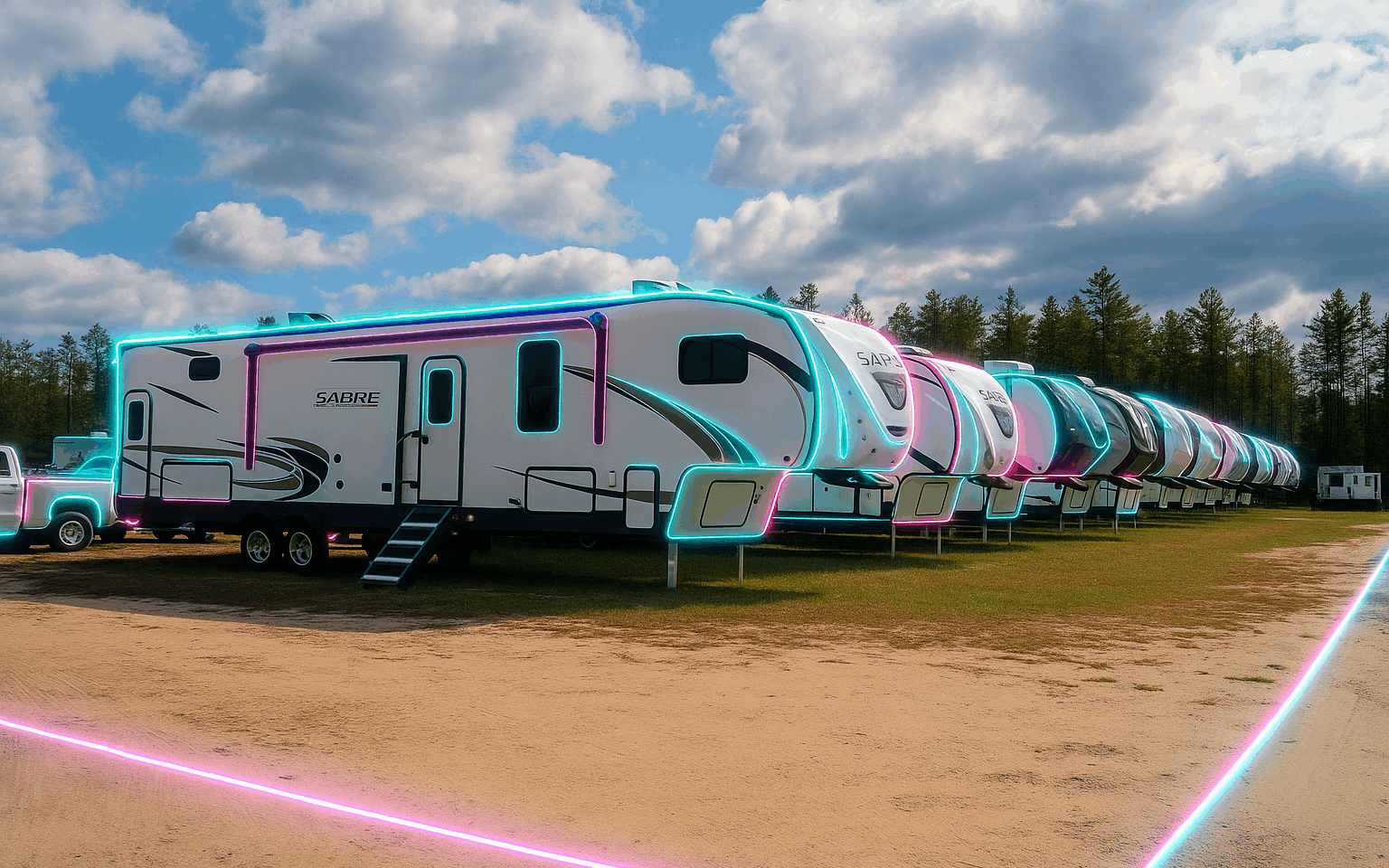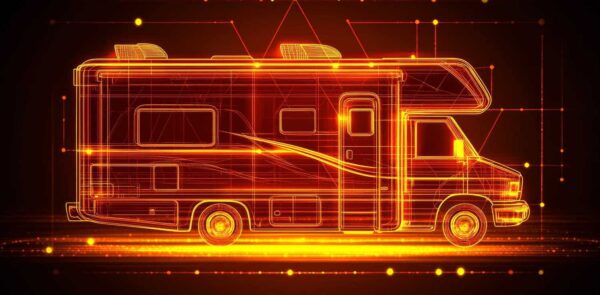
Jump to a section:
The RV industry navigates a complex recovery trajectory following unprecedented growth during the pandemic years. While shipments declined 37% in recent periods, industry experts project a rebound driven by sustained consumer interest in outdoor recreation and flexible travel options. The demographic profile of RV buyers continues evolving, with younger generations representing 22% of the market and demanding different experiences than traditional customers. Branded dealerships demonstrate 25-35% higher customer retention rates compared to generic competitors, while digital-first buyers spend significantly more time researching online before visiting physical locations. This environment rewards dealers who establish clear brand differentiation and authentic customer relationships built on trust, expertise, and exceptional service delivery.
Building Adventure-Focused Brand Identity
Modern RV brand strategy centers on lifestyle aspiration rather than product specification, recognizing that customers purchase dreams of freedom, adventure, and authentic experiences rather than simply recreational vehicles. The most successful dealers position themselves as enablers of the RV lifestyle, offering expertise, support, and community connection that extends far beyond transactional relationships. This approach requires fundamental shifts in messaging, visual identity, and customer engagement strategies that emphasize emotional benefits over technical features.
Adventure-focused branding leverages the psychological drivers behind RV ownership decisions, which typically involve major lifestyle changes, family bonding experiences, or retirement dreams. Effective brand narratives showcase real customer experiences, highlight local adventure opportunities, and position the dealership as a trusted guide for the RV journey. Visual identity elements should evoke exploration and freedom through nature-inspired color palettes, dynamic imagery, and messaging that emphasizes possibility and transformation.
The challenge lies in balancing aspirational messaging with practical considerations like service reliability, financing options, and ongoing support. Successful brands demonstrate competence and trustworthiness while maintaining the inspirational qualities that drive initial interest. This requires consistent execution across all touchpoints, from website design and social media content to showroom experiences and follow-up communications.
“The strongest RV dealer brands don’t just sell vehicles – they sell the promise of experiences yet to be discovered. When customers see your dealership as the gateway to their adventure dreams, price becomes secondary to trust and expertise.” – Strategy Team, Linchpin SEO
Core Elements of Adventure-Focused Brand Identity:
- Lifestyle Positioning: Marketing messages that emphasize experiences, freedom, and personal transformation rather than technical specifications
- Visual Storytelling: Photography and design elements that showcase RVs in inspiring natural settings with real customers enjoying adventures
- Community Building: Creating opportunities for customers to connect, share experiences, and build relationships around the RV lifestyle
- Expert Guidance: Positioning dealership staff as knowledgeable advisors who understand both RV technology and adventure planning
- Local Adventure Integration: Highlighting regional attractions, camping opportunities, and travel routes that customers can explore
Table: Brand Positioning Impact on Dealer Performance
| Brand Focus | Customer Retention | Referral Rate | Average Sale Value |
|---|---|---|---|
| Product-Focused | 45-55% | 15-20% | Baseline |
| Adventure-Lifestyle | 70-80% | 35-45% | 12-18% higher |
| Service-Excellence | 65-75% | 25-35% | 8-12% higher |
| Community-Centered | 75-85% | 40-50% | 15-22% higher |
Service Excellence as Brand Differentiator
Service excellence has emerged as the most critical brand differentiator in the RV industry, where customer care extends far beyond the initial sale to encompass the entire ownership experience. With repair event cycle times becoming industry-wide priorities and customer expectations rising dramatically, dealerships that demonstrate consistent service quality achieve significant competitive advantages. The most successful dealers transform service from a necessary function into a brand-defining experience that builds loyalty and generates referrals.
Modern service excellence encompasses predictive maintenance capabilities powered by data analytics, personalized communication that keeps customers informed throughout the service process, and proactive outreach that anticipates customer needs. AI-powered systems now enable dealers to predict maintenance requirements, schedule service appointments strategically, and provide customers with transparent updates about repair progress. These technological capabilities must be balanced with human expertise and empathy that acknowledges the emotional investment customers have in their RVs.
The financial impact of service excellence extends beyond immediate revenue to encompass customer lifetime value, referral generation, and reputation enhancement. Dealers recognized for service quality through industry awards like the DSI (Dealer Satisfaction Index) or manufacturer-specific excellence programs demonstrate measurably higher performance across multiple metrics. These recognitions serve as powerful marketing assets that differentiate dealers in competitive markets while building consumer confidence.
Service Excellence Implementation Strategies:
- Predictive Service Technology: AI-powered systems that identify maintenance needs before problems occur, reducing customer downtime and frustration
- Transparent Communication: Real-time updates about service progress, clear explanations of required work, and honest timelines that build trust
- Proactive Customer Care: Regular check-ins, seasonal maintenance reminders, and personalized recommendations based on usage patterns
- Staff Training Excellence: Comprehensive education programs that ensure consistent service quality across all customer touchpoints
- Customer Feedback Integration: Systematic collection and implementation of customer suggestions to continuously improve service delivery
Digital Transformation and Customer Experience
Digital transformation in RV dealerships extends beyond basic website functionality to encompass comprehensive customer experience orchestration that meets modern buyer expectations. Today’s RV shoppers conduct extensive online research, expect immediate responses to inquiries, and demand seamless integration between digital and physical interactions. Successful dealers create omnichannel experiences that provide consistent value whether customers engage online, visit showrooms, or require ongoing support.
The modern RV buying journey typically begins with online research that may span months before customers visit dealerships. This extended research phase requires sophisticated content strategies that educate prospects, build trust, and position dealers as knowledgeable advisors. Virtual tours, detailed product videos, and interactive tools that help customers compare options and calculate financing provide immediate value while capturing valuable lead information. Mobile optimization proves essential as many customers browse inventory while traveling or camping.
Customer relationship management systems must integrate seamlessly with marketing automation platforms to deliver personalized experiences at scale. This includes triggered email sequences that provide relevant information based on customer interests, automated appointment scheduling that reduces friction in the sales process, and follow-up systems that maintain engagement throughout extended decision-making periods. The most effective implementations balance automation with personal touch points that demonstrate genuine interest in customer success.
“Digital transformation isn’t about replacing human connections – it’s about amplifying them. The best RV dealers use technology to deliver more personalized, more timely, and more valuable interactions at every stage of the customer journey.” – Strategy Team, Linchpin SEO
Digital Experience Optimization Components:
- Interactive Inventory Tools: Advanced search functionality, 360-degree virtual tours, and comparison features that help customers evaluate options remotely
- Automated Lead Nurturing: Intelligent email sequences that provide relevant information based on customer interests and behaviors
- Mobile-First Design: Responsive experiences optimized for customers browsing while traveling or researching on mobile devices
- Live Chat Integration: Real-time customer support that provides immediate answers and reduces abandonment rates
- Social Proof Systems: Customer reviews, testimonials, and user-generated content that build credibility and trust
Table: Digital Channel Performance for RV Dealers
| Digital Channel | Lead Quality Score | Conversion Rate | Customer Lifetime Value |
|---|---|---|---|
| Organic Search | High | 12-15% | $3,200-4,500 |
| Social Media | Medium-High | 8-12% | $2,800-3,800 |
| Email Marketing | Very High | 18-25% | $4,000-5,500 |
| Referral Programs | Excellent | 35-45% | $5,200-7,000 |
Community Building and Customer Loyalty
Community building represents one of the most powerful but underutilized brand strategies available to RV dealers. The RV lifestyle naturally creates opportunities for social connection, shared experiences, and mutual support among owners. Dealers who facilitate these connections transform individual customer relationships into thriving communities that generate ongoing engagement, referrals, and repeat business. This approach recognizes that RV ownership often involves significant lifestyle changes that benefit from peer support and shared knowledge.
Successful community building initiatives create multiple touchpoints for customer interaction beyond traditional sales and service encounters. These might include organized camping trips, educational workshops, maintenance clinics, and social events that bring RV owners together. Digital communities through social media groups, online forums, or dedicated mobile apps provide ongoing connection opportunities and position dealers as community facilitators rather than simple vendors.
The loyalty benefits of community building extend far beyond immediate sales metrics to encompass long-term customer relationships that span multiple vehicle purchases and extensive referral networks. Customers who participate in dealer-sponsored community activities demonstrate higher lifetime values, longer ownership periods, and significantly increased likelihood to recommend the dealership to others. These relationships create competitive moats that are difficult for competitors to replicate through price competition or product features alone.
Community Building Strategies for RV Dealers:
- Organized Adventures: Dealer-sponsored camping trips, caravans, and rallies that create shared experiences and strengthen customer bonds
- Educational Programming: Regular workshops on RV maintenance, travel planning, and lifestyle optimization that provide ongoing value
- Digital Community Platforms: Private social media groups, forums, or mobile apps where customers can connect and share experiences
- Customer Recognition Programs: Awards, spotlights, and celebrations of customer adventures that encourage engagement and content sharing
- Peer-to-Peer Support: Systems that connect experienced RV owners with newcomers for mentoring and advice
Experiential Marketing and Showroom Innovation
Traditional showroom experiences no longer meet modern customer expectations, requiring innovative approaches that create emotional connections and demonstrate the RV lifestyle in tangible ways. Experiential marketing transforms static product displays into immersive environments that help customers envision their future adventures while building emotional attachment to specific vehicles and dealership brands. These experiences prove particularly valuable given the significant investment and lifestyle implications of RV purchases.
Modern showroom innovation incorporates interactive elements that engage multiple senses and create memorable experiences. This might include simulation areas where customers can experience RV systems in operation, camping setup demonstrations that show real-world usage scenarios, or themed display environments that recreate popular camping destinations. Virtual and augmented reality technologies enable customers to explore RV interiors thoroughly or visualize modifications and customizations before making purchase decisions.
The most effective experiential approaches extend beyond individual showroom visits to create ongoing engagement opportunities. Mobile showrooms that attend camping events, RV shows, and community gatherings bring the dealership experience directly to potential customers in relevant contexts. These mobile marketing vehicles serve dual purposes as sales tools and brand ambassadors that reinforce dealership positioning in target markets.
“Experiential marketing in RV retail isn’t about showcasing products – it’s about helping customers imagine their future selves living the adventures they dream about. When customers can feel, touch, and experience the lifestyle, emotional connections drive purchase decisions.” – Strategy Team, Linchpin SEO
Experiential Marketing Innovation Areas:
- Interactive Showroom Design: Themed environments that recreate camping experiences and demonstrate RV systems in realistic contexts
- Technology Integration: VR/AR experiences that allow customers to explore options and visualize customizations virtually
- Mobile Marketing Units: Custom-built vehicles that bring showroom experiences to events, campgrounds, and community gatherings
- Hands-On Demonstrations: Live setup sessions that show customers how to operate RV systems and equipment confidently
- Lifestyle Workshops: Educational events that teach camping skills, travel planning, and RV maintenance in engaging formats
Table: Experiential Marketing ROI Metrics
| Experience Type | Customer Engagement | Conversion Improvement | Implementation Cost |
|---|---|---|---|
| Interactive Showroom | 65% increase | 25-30% | High |
| VR/AR Integration | 80% increase | 35-40% | Medium-High |
| Mobile Marketing | 45% increase | 20-25% | Medium |
| Live Demonstrations | 55% increase | 15-20% | Low-Medium |
Table: Key Trends and Strategic Actions
| Trend | Strategic Action | Expected Outcome | Implementation Timeline |
|---|---|---|---|
| Adventure Brand Focus | Develop lifestyle-centered messaging and visual identity | 25-35% improvement in customer retention | Q1-Q3 2026 |
| Service Excellence | Implement predictive maintenance and transparent communication | 40-50% reduction in customer complaints | Q2-Q4 2026 |
| Digital Transformation | Create omnichannel customer experiences with mobile optimization | 30-40% increase in online lead conversion | Q1-Q2 2026 |
| Community Building | Establish customer events, digital groups, and loyalty programs | 60-80% increase in referral rates | Q2-Q4 2026 |
| Experiential Marketing | Transform showrooms and implement mobile marketing units | 25-35% improvement in conversion rates | Q3-Q4 2026 |
| Technology Integration | Deploy AI-powered customer service and predictive analytics | 20-30% improvement in operational efficiency | Q1-Q4 2026 |
Conclusion
The future of RV dealer success lies in building authentic brand connections that transcend traditional product-focused approaches. As the industry evolves toward lifestyle marketing, service excellence, and community building, dealers who embrace comprehensive brand strategies will create sustainable competitive advantages that drive both immediate sales and long-term customer loyalty. The most successful dealerships will be those that position themselves as adventure enablers, trusted advisors, and community builders rather than simply vehicle vendors.
At Linchpin SEO, we understand the unique challenges and opportunities facing RV dealers in today’s competitive marketplace. Our team specializes in developing comprehensive brand strategies that integrate adventure-focused positioning, digital transformation, and community building approaches tailored specifically for the RV industry. We help dealers create authentic brand experiences that resonate with customers seeking freedom, adventure, and lifestyle transformation while building sustainable business growth through strategic marketing excellence.
Ready to transform your RV dealership brand for lasting competitive advantage and customer loyalty? Contact the Linchpin team today to discover how we can help you build the authentic brand connections that drive both immediate sales success and long-term business growth. Let’s work together to position your dealership as the trusted partner for customers’ adventure dreams.


